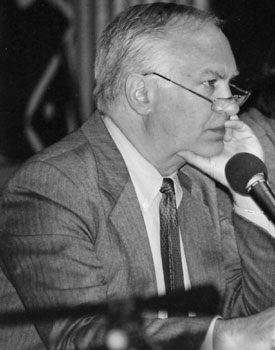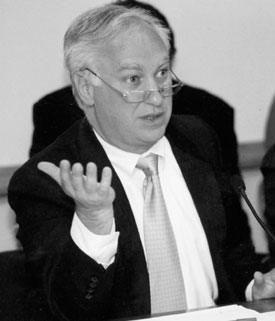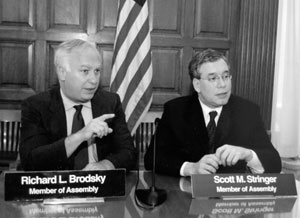|
Committee Introduces Constitutional Amendment
to Reform Public Authorities
Amendment will curb unchecked power of Authorities
As part of the Committee's reform agenda, a constitutional amendment was introduced that would eliminate
public authorities and move their functions, responsibilities, and budgeting back to the New York State
government agencies. The amendment is part of a larger package of reforms introduced by a bipartisan
group of legislators and a coalition of advocates spearheaded by Chairman Brodsky.
For the past three years the Committee has exercised unparalleled oversight into the operation of the hundreds
of State authorities that directly control so much of everyday life in New York. The Committee has exposed instances
of procurement lobbying abuses, lawless sale of public property, improper hiring practices, and tremendous
accumulation of debt. The Committee's findings illustrate the fundamental problem with New York's public
authorities - they have public missions but are isolated from traditional democratic pressure, and therefore
lack accountability to the people. They exist in a profoundly insulated institutional culture where public authorities
act as shadow governments making secret decisions often based on private interests, instead of their designated
purpose of serving the public good.
The constitutional amendment would abolish all State authorities; however, one essential purpose of well-run
authorities is to issue "revenue bonds." This debt is backed not by tax revenues but by the revenues
from the project constructed. For example, the New York State Thruway Authority issues "revenue bonds"
that are used to maintain and improve the Thruway. The bond-holders are repaid by toll revenues, not by tax revenues
of the State. This financing mechanism has become extremely useful in economic development projects, environmental
cleanup services, and for many other public services. Elimination of State authorities makes it necessary to give the State
itself such revenue bonding power, but with better controls, more transparencies, and less waste and corruption.
The Committee will continue to push for the passage of its authority reform package that includes an independent
Inspector General, an independent budget office, a central procurement office, and an end to the lawless disposition
of property. But, the true cure for institutional deficiencies is to pass the important constitutional reform to end the practice
of relying on quasi-public entities that have unchecked power in the traditional spheres of government.
Committee Investigates the Empire Zone Program
The Empire Zone Program was designed to help corporations create jobs or invest capital infrastructure in New
York communities experiencing economic decline, poverty, and unemployment. To stimulate job creation, the
program provides a range of tax benefits to encourage employers to locate and expand in the designated Empire
Zone. It has not functioned as intended and complete reform and overhaul is necessary.
In the Spring of 2004, the Committee on Corporations, Authorities, and Commissions, in cooperation with the
Committee on Ways and Means, the Committee on Economic Development, Job Creation, Commerce and Industry
and the Committee on Labor held public hearings on the Empire Zone Program, to examine criticisms that the tax
benefit was misused. Over the past year, evidence of program abuses has accumulated. For example, businesses
have received full zone tax benefits by simply changing their corporate identities. Additionally, many businesses
receiving the tax benefits have lost jobs or created jobs that are either only part-time or pay below the median wage
for a particular industry.
|
 Chairman Brodsky hears testimony on the Empire Zones Program.
Chairman Brodsky hears testimony on the Empire Zones Program.
|
Chairman Brodsky and the Committee expressed concern over a pattern of decisions in Monroe County in which
the Empire Zone designations were expanded to vacant buildings without promise of job creation or capital
investment. HSBC in Buffalo has also been under investigation by the Committee after it was discovered that the
company had fired employees and the reincorporated those same jobs in order to illegally receive benefits for
"creating" 3,000 jobs.
Chairman Brodsky said, "The Committee will continue to investigate the Empire Zone Program and
seek to correct flaws with the administration of the program. The Legislature must be proactive in preventing further
abuses of this program to ensure that the tax benefits are going to corporations that will aid the economic development
of New York State."
Committee on Corporations, Authorities,
and Commissions
Continues to work for Quality
New York Telephone Service
For the second year in a row, investigations by Chairman Brodsky and the Committee on Corporations, Authorities,
and Commissions revealed a significant decline in Verizon service quality in 2004. Verizon was fined $40 million for
missing two of the five major service quality targets statewide, with two others met only narrowly. Even within those
standards that were met, there was a measurable decline in quality.
The Committee's initial work on this issue was detailed in the May 2003 Report on Verizon Service Quality in New
York that first identified the decline in services and called for a stricter service quality system for all telephone companies.
The Public Service Commission (PSC) responded to the Report by ordering an audit of Verizon's entire service quality
program. The Verizon Retail Service Quality Audit Report's findings include both recognition that Verizon's efforts have
improved overall service quality for its New York customers, as well as 50 recommendations for maintaining and further
improving service. Verizon must respond to the PSC with its plan to implement these recommendations.
In addition to the statewide problems noted by the Committee, several localized areas continued to suffer from particularly
poor service, even after Verizon made public statements that those regions, which included Nassau County and areas
around Syracuse, Watertown, Johnson City, and Utica, would receive special attention.
"In the face of a mandate to improve its service, Verizon has cut its workforce and investments, and made false
promises that it could do more with less," said Assemblyman Brodsky. "We will continue to be vigilant until
service quality improves, and I urge the PSC to take further strong actions to create a more accurate and equitable
service quality system."
Chairman Brodsky and the Committee actively opposed the possible sale of Verizon's Upstate New York lines, when
the company considered selling 2.5 million access lines in the territory north and west of Westchester County to potential
private buyers. The Committee undertook a series of public hearings earlier this year to examine the consequences to
Upstate New York's economy if Verizon or the Rochester-based Frontier Communications were to sell their hard-wired
systems. Chairman Brodsky, one of the leading opponents of the sale, said, "Verizon's decision not to sell its lines
was a tremendous victory for Upstate New York's economy, but there are still many problems facing Verizon, including
pressure from unregulated providers of phone service. These problems require our attention if New York wants to ensure
universal access to affordable telephone service."
Committee Investigations Uncover Abuses of MTA Finances
 Chairman Brodsky questions a witness at an MTA public hearing.
Chairman Brodsky questions a witness at an MTA public hearing.
|
|
The Metropolitan Transportation Authority (MTA), one of the State's largest public authorities with an annual budget
of over $7 billion, is responsible for the largest transit system in the country. Every day, hundreds of thousands of
commuters rely on the roads, trains, buses and subways overseen by the MTA. Unfortunately, this public authority
has in past years mismanaged its funds and hidden facts from the public and the New York State Government.
The Committee on Corporations, Authorities, and Commissions has held a series of hearings to examine the
MTA and ensure that this public authority, on which so many New Yorkers rely, is held accountable.
Hearings held by the Committee, starting in December 2002, found that as the MTA was campaigning for a
33 percent fare increase, the public was not informed that the MTA had hidden $500 million in cash reserves,
making the immediate financial situation seem much more dire. In addition, the MTA publicly acknowledged a
$1.8 billion liability owed to its pension funds. While the MTA produces tens of thousands of documents annually, it
has repeatedly buried any useful information or neglected to include it. Such secretive manipulation of its finances
has damaged the MTA's credibility, and led to broad support for fundamental reform.
The Committee's hearings also revealed how the independence of the MTA's Inspector General (IG) had
been seriously compromised, and over a dozen investigations had been obstructed and thwarted by the MTA.
In 2000, MTA Chairman, E. Virgil Conway, refused to provide documents to the IG in fifteen cases, citing
attorney-client privilege against its own IG. Because of this unprecedented and unfounded lack of cooperation,
the IG closed six investigations of fraud and abuse in the MTA system. This same IG was then subsequently
denied reappointment by the Governor. The Committee also heard testimony concerning the inherent conflict of
interest that arises from the Governor appointing the Inspector General, senior executives and Board members
that the IG is charged with policing. This conflict of interest does not lend itself to either the appearance or reality
of independent investigations.
Perhaps the most serious problem revealed by the Committee hearings is evidence that an influential former
United States Senator, Alphonse D'Amato, was hired by a contractor to lobby the MTA Chairman to prevent the
MTA's attorneys from defending MTA and taxpayer interests. As a result of the Senator's lobbying, the MTA
Chairman did make a call to an MTA employee, and the MTA's protective actions ceased. This single phone call
earned the former United States Senator $500,000. At the request of the Committee, the MTA Inspector General
has begun a formal inquiry into the matter.
This fall, the Committee held a series of public hearings to examine the MTA's capital and operating budgets.
Chairman Brodsky met with MTA officials in Staten Island, Queens, Brooklyn, the Bronx, Manhattan, Long Island,
and Westchester County to review their plans to balance the MTA budget. Witnesses from the MTA, workers' unions,
and advocacy groups were put under oath and asked tough questions about fare increases, service cuts, and
expansion on the far West Side of Manhattan.
Taken together, the failure to reveal significant financial information in the past, the interference in important
corruption investigations, and the ability of a well-connected and well-compensated lobbyist to interfere with
the interests of the Authority are evidence of an agency in crisis, again citing the need to reform public authorities.
In the meantime, the MTA has promised to address these matters in its attempt to reorganize its operations.
The Committee is awaiting such action, and will monitor it closely.
Committee Hearings Yield Legislation on Javits Expansion -
Stadium Yet to be Decided
Chairman Brodsky and Assemblyman Scott Stringer, Chairman of the Committee on Cities, held a public
hearing in June 2004 on legislation authorizing the $1.4 billion expansion of the Jacob K. Javits Convention
Center, and the proposal for the new stadium on the West Side of Manhattan, as introduced by the Governor
and Mayor Bloomberg. As a result of this hearing, the Javits Convention Center expansion legislation was
separated from the proposal to build the West Side stadium, a much more expansive project. Both the
Assembly and the Senate have passed the bill and the Governor has signed it into law. The hearing also
presented the Committee with more detailed information on the project's impact on community and city
planning, the financing mechanism, the oversight and approval processes, and allowed the affected parties to
comment on the project in a public forum. Witnesses who testified at the hearing included: Deputy Mayor Daniel
Doctoroff; Counsel for the Empire State Development Corporation, Anita Laremont; Chair of the Manhattan
Community Board Number 4, Walter Mankoff; State Senator Liz Krueger; President and CEO of New York City
Partnerships, Kathy Wylde; Executive Director of the MTA, Katherine Lapp; Chairman and CEO of the Building and
Trades Employers' Association, Louis Coletti; President of the Buildings and Trades Council, Ed Malloy; Vice
President of MSG Development, Andrew Lynn; from the New York Association for Better Choices, Anna Levin;
Chairman of New York City and Company, Jonathan Tisch; from the Hotel Association of New York, Joseph
Spinnato; from the Hell's Kitchen-Hudson Yards Alliance, Joe Restuccia; President of the Municipal
Arts Society, Kent Barwick; and Architect, Frank Sanchez.
By separating the expansion of the Javits Convention Center from the West Side stadium project, the New
York State Legislature can now resolve the significant financial and community issues that are raised by the
Governor and Mayor's stadium proposal.
Chairman Brodsky said "I'm pleased that the Assembly's hearings led to legislation that permits the
expansion of the Javits Center, no longer holding it hostage to the West Side stadium. There is widespread
support for the expansion of the Convention Center, and agreement on the benefits it will bring to New York.
But the stadium proposal raises important and sensitive issues, including effects on the environment and the
neighborhood, as well as consequences to the city economy. By moving forward on a Javits expansion bill, we
have met our responsibilities to the city, the West Side, and to those who can now decide the stadium issue on
its own merits."
Committee Introduces Reform Package
to End Public Authority Abuses
Chairman Brodsky has engaged the Committee on Corporations, Authorities, and Commissions in a systematic
review and analysis of the way that the State's public authorities provide the services they perform with specific
focus on efficiency, transparency, and accountability. As a result of the investigations into the working of individual
authorities and numerous public hearings, Chairman Brodsky introduced Bill A.9010C, the Public Authorities
Reform Act of 2004. This legislation will bring the necessary transparency and accountability to public authorities
that have been missing in the past.
The bill was designed to improve the accountability of the public authorities by: establishing a vigorous and
independent Inspector General with the powers and staff needed to do the important job of policing the behavior
of officers and employees of public authorities; creating an Independent Budget Office to review, analyze, and publish
budget information for public authorities before policies and financial decisions are made; and creating a Central
Procurement Office for public authorities to end procurement lobbying abuses and regulate the sale of public authority
assets.
Assemblyman Brodsky said, "Literally billions of dollars are spent each year by the hundreds of public
authorities throughout the State. After analyzing the findings from Assembly hearings into events at the Metropolitan
Transportation Authority, the Thruway Authority, and the Canal Corporation we have shown that we cannot afford to
continue allowing public authorities the opportunity to spend taxpayers' money irresponsibly."
This legislation passed the Assembly on February 9, 2004, but requires action from Senate and the Governor.
|

 Chairman Brodsky and Assemblyman Scott Stringer, Chairman of the Committee on Cities, hear testimony on
plans to develop the West Side in Manhattan. For more information, see the article
("Committee Hearings Yield Legislation on Javits Expansion. . .")
Chairman Brodsky and Assemblyman Scott Stringer, Chairman of the Committee on Cities, hear testimony on
plans to develop the West Side in Manhattan. For more information, see the article
("Committee Hearings Yield Legislation on Javits Expansion. . .")

 Chairman Brodsky hears testimony on the Empire Zones Program.
Chairman Brodsky hears testimony on the Empire Zones Program.
 Chairman Brodsky questions a witness at an MTA public hearing.
Chairman Brodsky questions a witness at an MTA public hearing.